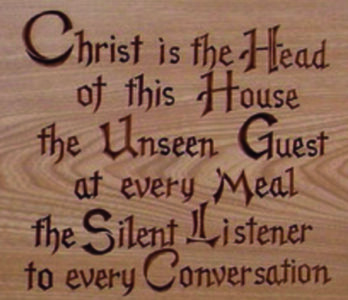Putting on Love over the Bones of Catholic Faith
The Covid contagion has brought renewed awareness of family life. This has to be good news. The Catholic Church traditionally has held family life in the home as important. Perhaps there will be spiritual renewal of sacramental life with some emphasis on living out the virtue of love evangelically at home. Mums and dads traditionally need help and guidance from the Church to live out the battle between love and pride as they attempt to bring their children into God’s love.
Bringing the Word into marriage and family life is no picnic. It is jolly hard work which requires parents, particularly mothers, to live out their baptismal vows daily. This work is classically Catholic in that it has its reward in heaven. Of a mother’s sacramental service to her family, the parish, the universal Church and wider society Pope St Paul VI says, “Every mother is like Moses. She does not enter the Promised Land. She prepares a world she will not see.”
For Word and Sacrament to grow together as one, a mother needs a prayerful relationship with scripture which they can bring to bear on the bones of her Catholic faith. Devotional aids can be a helpful influence in this work. There is a plaque which can sometimes be found on the walls of Catholic homes. It says, “Christ is the head of this house, the unseen guest at every meal and the silent listener to every conversation.”
 Getting Christ off the wall and into the heart of home life is a deeply relational undertaking. A mother is forever giving of her own flesh and blood to feed others, putting flesh on the bones of her children’s faith. Without her vocation in the Church, the bones of communal, grassroots Catholic faith begin to lose their connectivity, becoming dry and brittle, lacking that aspect of love which is deeply connective, efficacious and somewhat contemplative.
Getting Christ off the wall and into the heart of home life is a deeply relational undertaking. A mother is forever giving of her own flesh and blood to feed others, putting flesh on the bones of her children’s faith. Without her vocation in the Church, the bones of communal, grassroots Catholic faith begin to lose their connectivity, becoming dry and brittle, lacking that aspect of love which is deeply connective, efficacious and somewhat contemplative.
Of course, there is plenty of love in family and parish life today but its activity is not evangelical enough because it is not sufficiently earthed in God and God’s desire to be a personal, relational God in each person’s messy, everyday life. Jesus Christ, before he became a saying on the wall, says in St. John’s Gospel, that his followers will be known by their love for one another. To outsiders, the most obvious sign that evangelical love is being lived by Christians is unity and growth.
These benefits of faith do not come easily to home and parish life. The cost to personal pride is high, the beginnings of the benefits lowly. In his book “Let Us Dream,” Pope Francis says, “Of all the institutions, the family has taken the hardest knock of all. It has lost or at least blurred its social identity as the ‘first society’ where a person is formed as a member of something larger.”
Looking into family life around the time when children reach the age of reason, we might see how a mother brings this sense of “something larger” into the life of her child and connects it to everyday experience. Reconciliation is the Sacrament in which a child’s relationship with the Word begins in earnest. A mother has already tuned her child’s sensibilities to the Christian fact that God loves little children no matter what they do. But she knows the time comes when those little sensibilities need to be nuanced in the Catholic faith.
 The child’s catechetical, institutional experience of the Sacrament which goes on in schools and parishes needs the added benefit of a mother’s vocation. She must love the Sacrament into the child through their own love of sacramental life. The child who has witnessed his or her mother listening attentively to the Word proclaimed at Mass on Sunday will sense that the Word is important to her. Children who witness their parents going to confession regularly will have some sense of connection between the Word proclaimed and the Sacrament lived.
The child’s catechetical, institutional experience of the Sacrament which goes on in schools and parishes needs the added benefit of a mother’s vocation. She must love the Sacrament into the child through their own love of sacramental life. The child who has witnessed his or her mother listening attentively to the Word proclaimed at Mass on Sunday will sense that the Word is important to her. Children who witness their parents going to confession regularly will have some sense of connection between the Word proclaimed and the Sacrament lived.
 A mother who examines her consciences regularly has contemplative, silent, conversations with God. Whereas a secular person may mindfully stop and smell the roses, a mother puts to work that ‘better part’ of her love which Jesus Christ speaks of in the Gospel. During the Sacrament, when she encounters Jesus Christ, she is becoming an evangelical penitent. Her life is at the service of the Gospel. Before leaving the Church, a mother has another silent conversation with God. This prayer has not the overtones of an examination, but manifestations of joy.
A mother who examines her consciences regularly has contemplative, silent, conversations with God. Whereas a secular person may mindfully stop and smell the roses, a mother puts to work that ‘better part’ of her love which Jesus Christ speaks of in the Gospel. During the Sacrament, when she encounters Jesus Christ, she is becoming an evangelical penitent. Her life is at the service of the Gospel. Before leaving the Church, a mother has another silent conversation with God. This prayer has not the overtones of an examination, but manifestations of joy.
Leaving the formality of the Sacrament, a mother is a forgiven sinner. Her love is becoming more muscular and missionary by the minute. She carries within her God’s grace newly received which she puts to work when she gets home. On reaching home she does not enter a utopian household. She brings the presence of Jesus Christ into this home, into this building where these persons big and small form a miniature world in which Original Sin exists in all its pettiness.
Within a very short time of coming through the door, someone in the family will be sinning against someone else! Those petty human failures to love one another, all that pride which prompts human beings to be right, to have the last word, to get even, are going on around them, threatening the peace of the home and the unity of her family. That wonderful feeling of having sins forgiven seems to evaporate as she heads into the fray of her family life.
But though the feeling evaporates, the work of grace goes on. She is deeply, connectively yoked in love to Jesus Christ. His presence within her feels like part of her personhood rather than a saying on the wall. And it is through her personhood that Jesus Christ, the Word made flesh, is delivered in person to all persons of the household.
Nowhere is that evangelical work needed more than when the family sits down to the evening meal. Here all the sinners and the sinned against, those who are forgiven and those who await the words “I am sorry” from a husband, wife, sibling must sit in close proximity. As well as having cooked the meal, a mother must now perform a minor miracle.
 Getting family members to hold hands and say Grace goes some way towards unity even if the handholding may be done with varying degrees of love! Sitting down last at the table, a mother may feel she has come into some sort of cosmic battle between pride and holiness which is being acted out around the table. Feelings of being powerless to make her family life holy are common enough, which is why she woos, nay begs, the peace of Jesus Christ to grace the table.
Getting family members to hold hands and say Grace goes some way towards unity even if the handholding may be done with varying degrees of love! Sitting down last at the table, a mother may feel she has come into some sort of cosmic battle between pride and holiness which is being acted out around the table. Feelings of being powerless to make her family life holy are common enough, which is why she woos, nay begs, the peace of Jesus Christ to grace the table.
When that peace sits at the table with her family, a mother feels not the cosmic battle. She feels raised up into a rather splendid, cosmic dance in which pride felt and acted out is conquered by the forgiving presence of Jesus Christ at her table.

 Entries(RSS)
Entries(RSS)